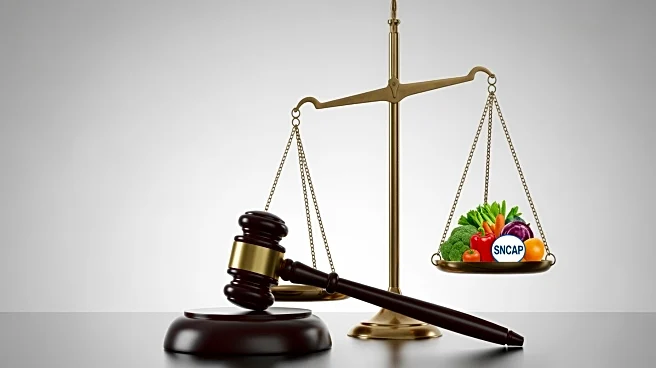What's Happening?
President Trump has opted to defy a court order from Judge John McConnell, Jr. in Rhode Island, which directed the Department of Agriculture to utilize reserve funds to fully fund November SNAP entitlements.
The court had instructed the USDA to either tap into a $23 billion reserve fund for Child Nutrition Programs or use $4.6 billion in SNAP reserves for immediate partial payments. Instead, the USDA issued revised issuance tables to state agencies, transferring the responsibility to individual states to adjust their funding requests. The administration has sought relief from the First Circuit, arguing that the injunction undermines the separation of powers. The case may proceed to the Supreme Court, where the administration will argue that the separation of powers allows the president discretion in funding decisions.
Why It's Important?
The decision by President Trump to challenge the court order has significant implications for the 41 million Americans who rely on SNAP benefits. The administration's stance highlights a broader debate over executive power and the separation of powers, potentially affecting how federal funds are allocated during government shutdowns. The outcome of this legal battle could set a precedent for future interactions between the executive branch and the judiciary regarding emergency funding and social welfare programs. Stakeholders, including state governments and advocacy groups, are closely monitoring the situation, as it impacts the ability of states to provide essential food aid to vulnerable populations.
What's Next?
The First Circuit is expected to rule on the administration's request for relief, which could lead to further legal proceedings at the Supreme Court. If the administration's appeal is successful, it may delay or alter the distribution of SNAP benefits, affecting millions of recipients. Political leaders and advocacy groups may increase pressure on the administration to comply with the court's order, emphasizing the legal and moral obligations to support those in need. The situation remains fluid, with potential implications for ongoing political negotiations and public policy regarding social welfare programs.
Beyond the Headlines
The legal battle over SNAP funding raises ethical questions about the government's responsibility to provide for its citizens during times of crisis. It also underscores the tension between political objectives and humanitarian needs, as the administration's actions are perceived by some as leveraging social welfare programs for political gain. The case may influence public opinion on the role of government in ensuring food security and the balance of power between federal and state authorities.










